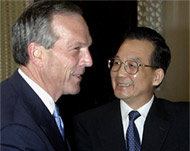Sino-US trade row may get tempered
With Chinese Premier Wen Jiabao in Washington, much debate is focused on whether there will be a resolution to the ongoing Sino-US trade dispute.

Primarily seen as politically motivated given next year’s US presidential election, discussions regarding China’s WTO commitments have already resulted in tariff restrictions being imposed on a number of Chinese products.
China experts believe, however, that the dispute will be tempered by wider considerations, notably the importance of maintaining good bi-lateral relations and avoiding a trade war.
Protests
Since September, when arguments over revaluing the Chinese currency began making headline news, America has publicly raised a number of complaints regarding China and its commitment to WTO rules.
These complaints have focused not just on currency revaluation but also on the issues of subsidies to local firms and intellectual property right abuse.
With a 2003 trade deficit projected to be over $120 billion and 2.7 million Americans unemployed since Bush’s election, Congress has been under pressure to act, or at the very least, distract attention away from domestic failings.
The result has been Congressional measures to impose higher import tariffs, an option open to them under WTO law. Certain televisions now face duty charges ranging between 28-78% while various textile items can only increase their US market growth by 7.5% next year, even though industry production capacity will grow by at least 30%.
Applying pressure
|
“The State Department is clearly not supportive of Congress’s behaviour. They have an opinion of where China should be moving but raising tariff barriers against them is not the way” Andy Xie, |
But although these measures were officially attacked by the Chinese Ministry of Commerce as “unfair, discriminatory and a violation of free trade principles,” Academy of Social Sciences trade specialist Song Hong is not worried.
“Overall, the relationship is very good and is making progress,” he believes, echoing in effect recent statements made by both American and Chinese political leaders.
For Song Hong, these particular products are worth only a tiny percentage of overall Sino-US trade and should simply been seen as a piece of light muscle flexing by the Americans.
Ultimately, Hong believes further economic pressure will be self-defeating as America is dependent upon China’s cheap imports to increase consumer spending, a view shared by Andy Xie, chief Asia economist for Morgan Stanley.
“At most, the US can expect a short term bonus from raised tariffs,” he said.
Citing the US-Japanese trade wars of the 1980’s, Xie explained that US manufacturers would not subsequently undercut Chinese prices as Congress might intend, but would instead seek to maximize profits by offering similar prices and stressing quality.
The net result would be higher prices for the US consumer and a slow down in spending or a rise in household debt.
No unity
Nor does it seem that all sections of the US government are behind recent Congressional actions. According to one Western diplomat, there are obvious divisions.
“The State Department is clearly not supportive of Congress’s behaviour. They have an opinion of where China should be moving but raising tariff barriers against them is not the way,” adding that, “at the end of the day, China is working towards solutions, and people should perhaps move away from seeing high imports as a negative factor if they result in cheap goods in the store.”
 |
|
US Commerce Secretary Don |
In fact, while Congress blames China for taking manufacturing jobs away from the United States, most economic commentators point to an increase in productivity as being the primary cause for unemployment.
Tariffs
According to Charles Martin, executive director of the American Chamber of Commerce in Beijing (AmCham), only 15% of the US manufacturing jobs lost over the last five years have been relocated to China.
On this, Hong Kong economist, Steven Huang says, “Tariffs will only help prop up the ineffective part of the US economy such as manufacturing when what is really needed is internal reform.”
Federal Reserve Chairman Alan Greenspan has warned against “creeping protectionism” and the realization that $24 billion worth of American goods are imported by China, a figure that would only decrease if a trade war between the two countries broke out.
Further evidence that the dispute is contained, says Song Hong, can be seen in China’s so far muted reaction to events, an indication that Beijing sees this primarily as a US domestic political issue and not as a trade war prelude.
Positive moves
Besides summoning the US ambassador twice in one week to explain himself, Beijing has actually been making several conciliatory gestures.
American products valued at $6 billion were recently purchased and there is now talk of reducing some of the tax rebates that AmCham and others were complaining about.
According to Martin, after refusing to give in on the currency issue, the key thing now is for the Chinese to be able to offer something to placate American opinion. This, he believes, will only be fully tested during Premier Wen’s talks with US officials.